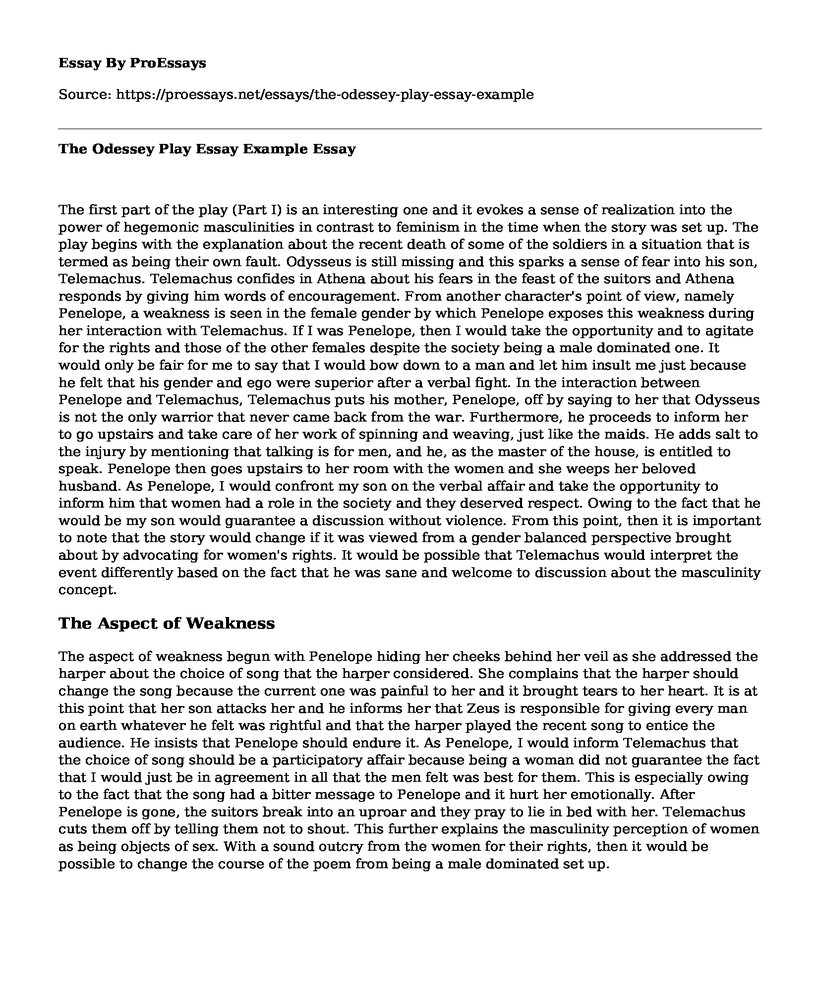The first part of the play (Part I) is an interesting one and it evokes a sense of realization into the power of hegemonic masculinities in contrast to feminism in the time when the story was set up. The play begins with the explanation about the recent death of some of the soldiers in a situation that is termed as being their own fault. Odysseus is still missing and this sparks a sense of fear into his son, Telemachus. Telemachus confides in Athena about his fears in the feast of the suitors and Athena responds by giving him words of encouragement. From another character's point of view, namely Penelope, a weakness is seen in the female gender by which Penelope exposes this weakness during her interaction with Telemachus. If I was Penelope, then I would take the opportunity and to agitate for the rights and those of the other females despite the society being a male dominated one. It would only be fair for me to say that I would bow down to a man and let him insult me just because he felt that his gender and ego were superior after a verbal fight. In the interaction between Penelope and Telemachus, Telemachus puts his mother, Penelope, off by saying to her that Odysseus is not the only warrior that never came back from the war. Furthermore, he proceeds to inform her to go upstairs and take care of her work of spinning and weaving, just like the maids. He adds salt to the injury by mentioning that talking is for men, and he, as the master of the house, is entitled to speak. Penelope then goes upstairs to her room with the women and she weeps her beloved husband. As Penelope, I would confront my son on the verbal affair and take the opportunity to inform him that women had a role in the society and they deserved respect. Owing to the fact that he would be my son would guarantee a discussion without violence. From this point, then it is important to note that the story would change if it was viewed from a gender balanced perspective brought about by advocating for women's rights. It would be possible that Telemachus would interpret the event differently based on the fact that he was sane and welcome to discussion about the masculinity concept.
The Aspect of Weakness
The aspect of weakness begun with Penelope hiding her cheeks behind her veil as she addressed the harper about the choice of song that the harper considered. She complains that the harper should change the song because the current one was painful to her and it brought tears to her heart. It is at this point that her son attacks her and he informs her that Zeus is responsible for giving every man on earth whatever he felt was rightful and that the harper played the recent song to entice the audience. He insists that Penelope should endure it. As Penelope, I would inform Telemachus that the choice of song should be a participatory affair because being a woman did not guarantee the fact that I would just be in agreement in all that the men felt was best for them. This is especially owing to the fact that the song had a bitter message to Penelope and it hurt her emotionally. After Penelope is gone, the suitors break into an uproar and they pray to lie in bed with her. Telemachus cuts them off by telling them not to shout. This further explains the masculinity perception of women as being objects of sex. With a sound outcry from the women for their rights, then it would be possible to change the course of the poem from being a male dominated set up.
Cite this page
The Odessey Play Essay Example. (2022, Jul 08). Retrieved from https://proessays.net/essays/the-odessey-play-essay-example
If you are the original author of this essay and no longer wish to have it published on the ProEssays website, please click below to request its removal:
- Comparative Essay Sample: Little Children and Hamlet
- Tradition Practiced In The Lottery by Shirley Jackson
- Essay on Myceneans: Pioneers of Ancient Greece and Language
- Essay Example on Comparing Wordsworth and Sidney: Sleep Poems
- Paper Example on The Iliad and Odyssey: A Tale of Latecomers From the East
- Essay Example on Comparison of Motifs in Virginia Woolf's 'A Haunted House' and Henry James' 'The Jolly Corner'
- Gifts: Attractive, Responsible, Fearsome Abilities - Book Review Sample







